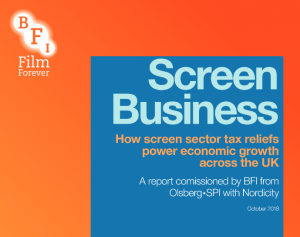
After more than 40 years of operation, DTVE is closing its doors and our website will no longer be updated daily. Thank you for all of your support.
BFI: Tax credits spur record levels of TV production spend
High-end tax credits for the UK’s television sector generated a record spend of £896.7 million in 2016, marking a doubling of local production over four years, according to a new report by The British Film Institute.
 The BFI report has shown that an estimated £632 million in tax relief seeded £3.2 billion in direct production spend across all screen sectors in 2016, a 17% increase from £2.7bn in 2015.
The BFI report has shown that an estimated £632 million in tax relief seeded £3.2 billion in direct production spend across all screen sectors in 2016, a 17% increase from £2.7bn in 2015.
The high-end television tax relief was introduced in 2013 and applies to British scripted drama with budgets of more than £1m per broadcast hour.
Production companies can claim tax rebates of up to 25% of their UK expenditure.
TV production has almost doubled since the tax credit was introduced, rising from £414.9m in 2013 to £896.7m in 2016. The figure is 4.5% higher than 2015 figures of £858.1m.
It is estimated that around £179.4m of tax relief was claimed against the 2016 production spend.
The report indicates that high-end TV also generated £580.2m in revenue for UK broadcasters in 2016 – representing 4.2% of the broadcasting sector’s total revenue – and an estimated £185.8m in revenue for other video platforms, such as SVODs and VOD and TVOD platforms, in addition to DVD and Blu-ray sales and rentals.
The BFI’s interim figures for 2017 have indicated that TV production spend is set to reach 984.6m.
Elsewhere, production spend for animated TV came in at £97.1m – up 27% from £76.2m in 2013.
Meanwhile, children’s TV – which became eligible for tax credits in April 2015 – generated £61m over the first year of its dedicated incentive across 36 programs.
Overall, more than 137,000 full-time equivalent jobs were generated by tax-relief supported screen production in 2016.
The sector also generated more than £850m in capital investment in new production facilities across the UK.
Access the full report via the BFI website.

